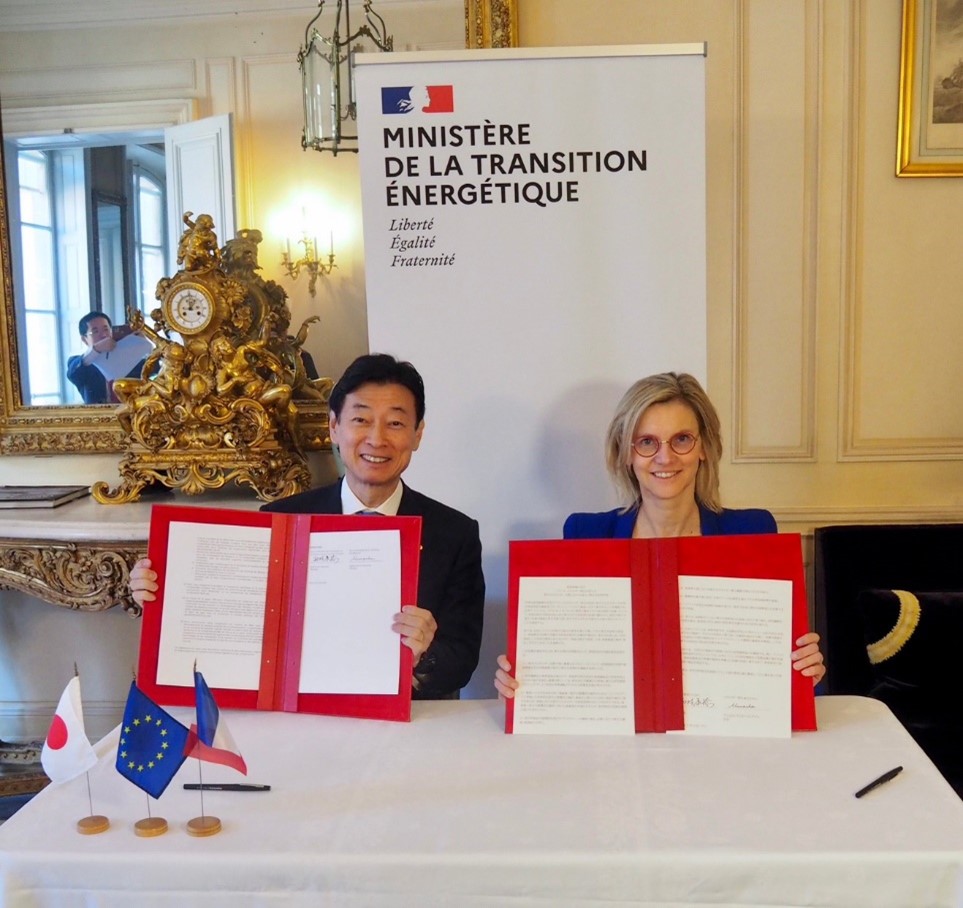 At a meeting in Paris, Japan's Minister of Economy, Trade & Industry industry Nishimura Yasutoshi and France’s Minister of Energy Transition Agnès Pannier-Runacher signed a joint statement to further deepen their cooperation. The ministers affirmed that the two countries will work for the maximum use of nuclear energy to ensure a stable energy supply and achieve carbon neutrality.
At a meeting in Paris, Japan's Minister of Economy, Trade & Industry industry Nishimura Yasutoshi and France’s Minister of Energy Transition Agnès Pannier-Runacher signed a joint statement to further deepen their cooperation. The ministers affirmed that the two countries will work for the maximum use of nuclear energy to ensure a stable energy supply and achieve carbon neutrality.
Japan’s Ministry of Economy, Trade & Industry (Meti) said in a statement: “The France-Japan cooperation that we have maintained for since the agreement of cooperation signed in 1972, in the energy field is rich and benefits both our countries. The joint statement that we have just signed today in the nuclear field is further proof of the quality of this bilateral relationship.”
In particular, France and Japan agreed to accelerate exchanges, including support for R&D on:
- safe long-term operation and safety improvement of existing nuclear reactors,
- steady and efficient decommissioning of NPPs, including enhancing industrial cooperations for the decommissioning of Fukushima Daiichi Nuclear Power Station,
- the improvement of nuclear energy capacity building in embarking countries,
- the promotion of the reprocessing policy that minimises waste and reduces the need for natural uranium, and
- next-generation advanced reactors, especially on sodium-cooled fast reactors.
“Through this agreement, France and Japan also wish to accelerate technical cooperation on the nuclear fuel cycle and underline the importance of building a robust nuclear supply chain between countries sharing common values, and other potential fields,” Meti noted.
The agreement followed talks on the sidelines of the Group of Seven energy and climate meeting in Sapporo in April, where the ministers discussed cooperating on a relaunch of nuclear energy in Japan as a way to meet rising power demand without a spike in greenhouse gas emissions.
Nishimura stressed after signing the statement that Japan will invest JPY46bn ($337m) over three years beginning in April 2024 to help develop sodium-cooled fast reactors. He said France has continued research on fast reactors for a long time, and that access to French knowledge and expertise will help increase the chances of successful development.
However, critics noted that Japan has decided to scrap its prototype fast-breeder reactor Monju, while France has also cancelled its research project on a new fast reactor, Astrid.
Monju was shut down in 1995, just four months after it began operation when about 700kg of liquid sodium leaked from the secondary cooling loop. Although there were no injuries and no radioactivity escaped plant buildings. Japan Atomic Energy Authority (JAEA) tried to conceal the scale of the damage.
Monju restarted in May 2010 but refuelling equipment fell into the reactor vessel during a refuelling outage later that year, and it has not operated since then. In November 2015, following concerns over lax equipment inspections, the Nuclear Regulation Authority determined JAEA was not competent to operate the reactor, and in December 2016, the government decided to decommission it.
Astrid was to be the successor to France’s three experimental fast reactors – Rapsodie, Phenix, and Superphenix – all of which have been decommissioned. In 2006 Commissariat a l'energie atomique et aux energies alternatives (CEA - Atomic & Alternative Energies Commission) by the government to develop two fourth generation fast reactors including the 600MWe Astrid which, in 2009, was made a high R&D priority because of its potential as an actinide burner. However, in August 2019, CEA dropped development.
Image: Japan's Minister of Economy, Trade & Industry industry Nishimura Yasutoshi and France’s Minister of Energy Transition Agnès Pannier-Runacher with the signed statement (courtesy of Reuters)



